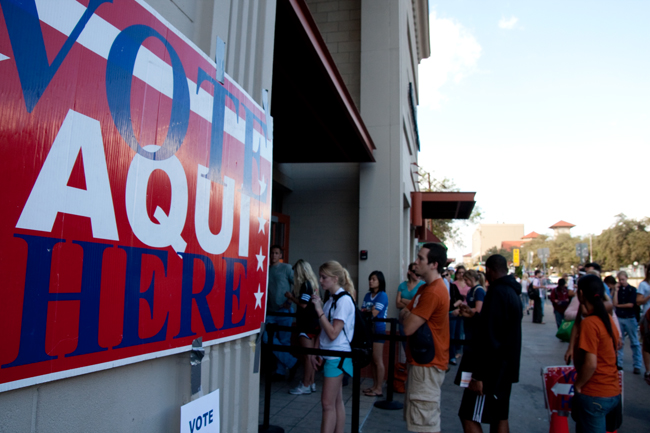A U.S. District Court shot down a proposed Texas voter ID law that would require citizens to produce government-issued photo identification to vote in the November election, sparking the fury of top Texas legislators. Texas is appealing the decision to the U.S. Supreme Court.
Proponents of the law have argued it will prevent voter fraud. Under the Voting Rights Act, states with a history of discriminatory voting practices that want to pass voter ID laws must prove any changes would not negatively affect minority voters. Opponents of voter ID laws say they prevent minorities from voting because many don’t have a photo ID and live too far away from a center that can issue one.
Billy Calve, director of Hook the Vote, a student government agency that works to increase student voting participation, said the new voter ID law would have been an extra burden on students, because it would have required a civilian’s driver’s license address to match his or her voter registration address.
“If you reside at a West Campus apartment or a dorm on campus, you would have had to make sure your driver’s license address matched that,” Calve said. “For many students, that is not the case. Students would have had to go out and get their driver’s license changed to match their Austin address.”
Assistant law professor Joseph Fishkin said the case focused primarily on the rights of minority citizens, not student rights.
However, Fishkin said the state decided against several amendments to the voter ID law that would have made it less strict and less likely to get struck down. One of them was to allow student IDs to be used as photo IDs at the polls.
“I wouldn’t make too much of a big deal of this, but the state legislature’s decision not to allow student IDs is one of the things that came back to haunt the state,” Fishkin said.
University Democrats President Leslie Tisdale said striking down the law is good news for students.
“It’s our job to back this decision by the courts because it really shows them that students are right here, we’re ready to vote and we want the opportunity to vote,” Tisdale said.
Christopher Elam, spokesperson for the Republican Party of Texas, said by striking down the law, the federal court was ignoring states’ rights.
“This administration and Eric Holder and his justice department have declared war upon the voter ID law, and they have made that an election-year issue in order to drive a wedge into the Republican Party,” Elam said.
Texas Attorney General Greg Abbott released a statement Thursday stating Texas would appeal the federal court’s decision to the U.S. Supreme Court, claiming similar voter ID laws were already upheld in other states.
“Today’s decision is wrong on the law and improperly prevents Texas from implementing the same type of ballot integrity safeguards that are employed by Georgia and Indiana — and were upheld by the Supreme Court,” Abbott said.
But Fishkin said the voter ID law in Texas came to the court under different circumstances.
“There are some important differences. The biggest difference is that case in Indiana was not brought under the Voting Rights Act,” Fishkin said. “And frankly, not every place has the kind of distance that we have, and a lot of these states don’t have this big of Hispanic populations either.”
The same federal court will review Abbott’s claim that Section 5 of the Voting Rights Act is unconstitutional. Section 5 requires states with a history of discriminatory voting practices to get preclearance from the federal government before changing any voting law.
Printed on August 31, 2012 as: "District Court rejects TX voter ID law"





















